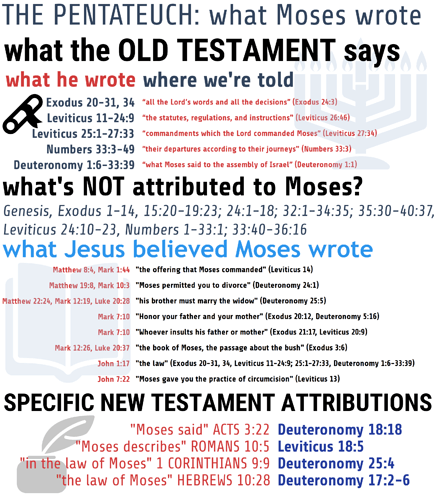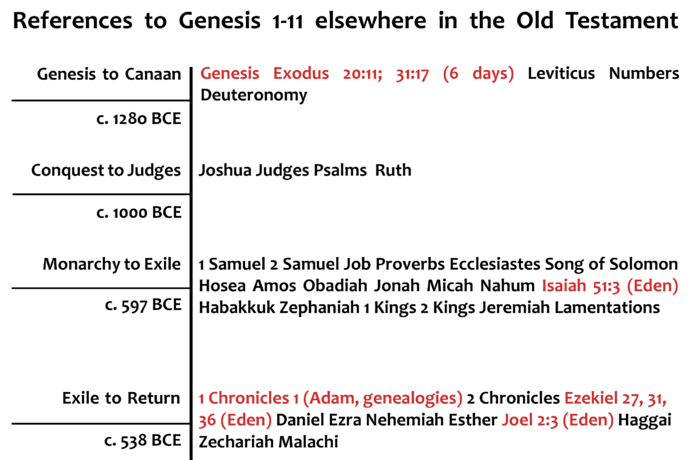Here’s a brief overview.
Now for specifics. Nowhere in the entire Law of Moses are Adam and Eve or the events of Eden ever referred to, despite the significant emphasis on sin, death, and sacrifice. Since the Law deals in considerable detail with the consequences of sin, the complete absence from Exodus to Deuteronomy of any reference to these people and events is extraordinary. Although genealogies in Genesis 4-5 start with Adam, all the genealogies from Genesis 12 through to the end of 2 Kings only extend as far back as Abraham.
Outside Genesis 1-11, Adam is first referred to in 1 Chronicles 1:1. The genealogy of 1 Chronicles 1 (written after the Babylonian exile), is the first genealogy after Genesis 5 to refer to Adam. In the Chronicles genealogy Adam is introduced without explanation, and the reader is expected to be familiar with him and his immediate descendants, suggesting they had already read a document introducing and explaining Adam and his family.
After Genesis 6-8, the flood is not referred to again until Isaiah 54:9. The first use of the word Eden outside Genesis 1-11 is in Isaiah 51:3. The next is in an exilic document (Ezekiel 28:12-19), taking the audience’s familiarity with Eden for granted; the reference to Eden in Joel 2:3 dates either to the exile or shortly after. This chapter also contains attacks on Babylonian theology, and explicit use of the Genesis cosmogony and the fall. The term ‘garden of the Lord’ is only used in two passages in the Old Testament; Genesis 13:10 and Isaiah 51:3, supporting the idea that the garden of the Lord was only known as ‘Eden’ during or after the exile.
The break between Genesis 11 and 12 is extreme. In Genesis 11:31 we are told Terah set out with his family (including Abram and Sarai), to travel from Ur to Canaan, but we are given no explanation for this whatsoever. In contrast, Genesis 12:1 opens with the divine call issued to Abram, providing details of the promises and the trip to Canaan; Genesis 11:31 presupposes the reader’s knowledge of why Abram is travelling to Canaan, indicating it was written after Genesis 12. Joshua is aware of the Mesopotamian origin of Abraham, but it is just as clear he knew of nothing earlier.
If these chapters did exist as early as Abraham (or at least Moses), then we must explain why they are ignored by most of the books of the Bible, and only suddenly referred to by the post-exilic books. From Genesis 12 to the end of 2 Kings, book after book after book shows no awareness of these chapters at all.
Certain vocabulary in Genesis 1-3 is used elsewhere only in books written during the monarchy or later, such as ʾēd (source of water, Genesis 2:6), neḥmād (pleasant, Genesis 2:9; 3:6), tāpar (sew, Genesis 3:7), ʾēbāh (enmity, Genesis 3:15), šûp (bruise/wound, Genesis 3:15) ʿeṣeb (labor, Genesis 3:16), tĕšûqāh (longing, Genesis 3:16). The word Shinar (Genesis 10:10; 11:2), was used by nations outside Mesopotamia “to designate the Kassite kingdom of Babylon (ca. 1595-1160 B.C.E)”; consequently its use here indicates Genesis 11 was written no earlier than the date of that kingdom. The Hebrew phrase for “breath of life” used in Genesis 2:7; 6:17; 7:15, 22, is not found anywhere else in Scripture. However, it is found in the Eridu Genesis, a Sumerian text which was copied and read by the Babylonians.
Certain names appear only in Genesis 1-11 and books written during or after the Babylonian exile; typically they appear later in 1 Chronicles 5 or later books as personal names, and in Isaiah and Ezekiel as place names. Some names appear as personal names before the exile, but as place names only during or after the exile. A few names appear only in Genesis 10.
- Gomer (Genesis 10:2-3, 1 Chronicles 1:5-6, Ezekiel 38:6, Hosea 1:3).
- Magog (Genesis 10:2, 1 Chronicles 1:5, Ezekiel 38:2; 39:6).
- Madai (Genesis 10:2, 1 Chronicles 1:5).
- Javan (Genesis 10:2, 4, 1 Chronicles 1:5, 7, Isaiah 66:19, Ezekiel 27:13).
- Tubal (Genesis 4;22; 10:2, 1 Chronicles 1:5, Isaiah 66:19, Ezekiel 27:13; 32:26; 38:2-3; 39:1).
- Meshech (Genesis 10:2, 1 Chronicles 1:5, Psalm 120:5, Ezekiel 27:13; 32:26; 38:2-3; 39:1).
- Tiras (Genesis 10:2, 1 Chronicles 1:5).
- Togarmah (Genesis 10:3, 1 Chronicles 1:6, Ezekiel 27:14; 38:6).
- Dodanim (Genesis 10:4).
- Dedan (Genesis 10:7; 25:3, 1 Chronicles 1:9, 32, Jeremiah 25:23; 49:8, Ezekiel 25:13; 27:20; 38:13).
- Akkad (Genesis 10:10).
- Erech (Genesis 10:10).
- Calah (Genesis 10:11-12).
- Resen Genesis 10:12).
Some verses in Genesis 1-11 use place names which help date the text. In particular, several verses in Genesis 10 indicate the chapter could not have been written until after the reign of Solomon.
-
Genesis 2:14; 10:11. These verses refers to Assyria, which did not exist until the reign of Assuruballit I (1363-1328 BCE). The city of Assur was built earlier (around 2,500 BCE), but was ruled over by Akkadians, Amorites, and Babylonians in succession. Assyria did not become an independent state with Assur as its capital reign of Assuruballit I.
-
Genesis 10:11. This verse refers to Nineveh as part of Assyria, but it was not until the reign of Assuruballit I (1363-1328 BCE), that Nineveh became part of Assyrian territory. Note that Nineveh is mentioned in Genesis 10:11-12, but not mentioned again until 2 Kings, written during the exile; this supports the conclusion that Genesis 11 was not written before the exile.
-
Genesis 10:11-12. This refers to the city of Calah as “that great city”. Calah did not exist until 1750 BCE, and was a mere village until the ninth century BCE, when it became “that great city” during the reign of Assurnasirpal II, who made it the capital of Assyria. It could not have been called “that great city” until after the reign of Solomon.
-
Genesis 10:19. The boundaries of Canaan described here did not exist until 1280 BCE by a peace treaty between Ramses II and Hattusilis III in 1280 BCE; it is therefore unsurprising that the borders of Canaan described here do not match the description of Canaan in Genesis 15:18 or Numbers 34:2-12, or any text of Moses’ time. This verse could not have been written earlier than 1280 BCE.
-
Genesis 10:19. This verse refers to Gaza, but this location was first called “Gaza” during the reign of Thutmose III (1481-1425 BCE); it was not called “Gaza” before this time. It would have been known as “Gaza” by the time of Moses, but not in the time of Abraham.
-
Genesis 11:28, 31. These verses refers to “Ur of the Chaldeans”. The Chaldeans did not occupy Ur until around the tenth century (1000 BCE). The only pre-exilic use of the phrase “Ur of the Chaldeans” in the Old Testament is in Genesis 15:7, which was clearly written at least as early as the eleventh century (possibly by Samuel), by which time the term “Ur of the Chaldeans” was already the common term for the area. The only other use of “Ur of the Chaldeans” is in Nehemiah 9:7, a post-exilic book.
Actually there are modern English translations such as New English Translation, NCV, NIV84, and NLT, which renders the word “Mizraim” rather than “Egypt”. This is pretty well recognized in scholarship. Some of these translations still believe that Mizraim here is another word for Egypt, but they recognize the ambiguity of the word so they render it without identifying it explicitly as Egypt.
Here’s one source which may be useful.
“Some scholars think that in a few passages referring to horses (1 K. 10:28; 2 K. 7:6; 2 Ch. 1:16f.; 9:28) the word should be emended to Muṣri or Muṣur, a land in Asia Minor (cf. Moff Muzri).”
John Alexander Thompson, “Mizraim,” ed. Geoffrey W Bromiley, The International Standard Bible Encyclopedia, Revised (Wm. B. Eerdmans, 1979–1988), 388.
Here’s another.
Scholars debate whether Mizraim refers not to Egypt, but to Musri, an Anatolian site known from Akkadian sources. Both 1 Kgs 10:28 (//2 Chr 1:16) and 2 Kgs 7:6 feature horses, for which Anatolia was more famed than Egypt. Furthermore, the pairing of Mizraim/Musri and Kue (1 Kgs 10:28 //2 Chr 1:16) resembles the monolith inscription of the 9th cent.BCE Assyrian king Shalmaneser III, which reports the inclusion of soldiers from Que and Musri in an anti-Assyrian coalition assembled in Syria.
Carolyn Higginbotham, “Mizraim,” ed. Katharine Doob Sakenfeld, The New Interpreter’s Dictionary of the Bible (Nashville, TN: Abingdon Press, 2006–2009), 117.
No I didn’t. It’s not an exception; this verse was added to Exodus by an exilic or post-exilic redactor. The evidence for this is that no one from Genesis 12 to the end of 2 Kings ever says the purpose of the Sabbath was to memorialize the six days of creation. On the contrary, when Moses explains the purpose of the Sabbath in Deuteronomy, he explicitly tells Israel that the purpose of the Sabbath was to memorialize the exodus from Egypt. He says absolutely nothing about it memorializing creation.

